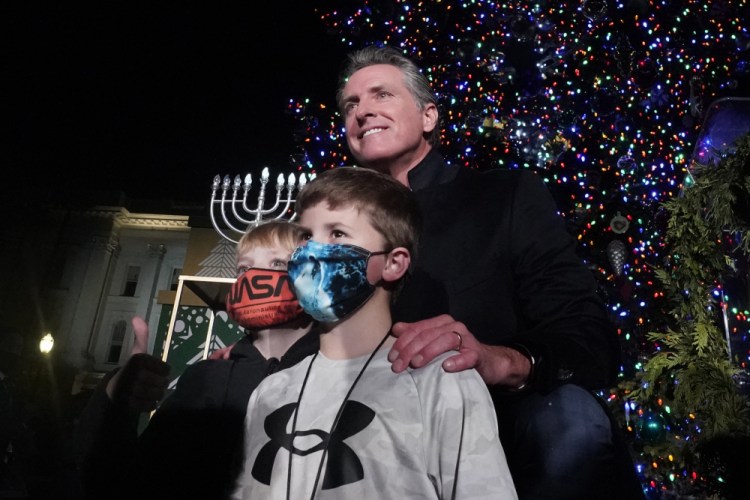SACRAMENTO, Calif. — California Gov. Gavin Newsom still can’t spell the word “dress.” He can’t read aloud from a piece of paper in public. That’s why his speeches are long, mostly from memory and sprinkled with some awkward moments when his words bump into each other.
Newsom accepts these challenges as part of his dyslexia – a common learning disability that makes it harder for him to read and do many things related to reading. He’s had dyslexia for most of his life, but it came into sharper focus for him recently after watching some of his own children fall behind in reading.
That prompted him to search for picture books about dyslexia to use with his kids. But he was surprised when he did not find many. So he wrote one.
“Ben & Emma’s Big Hit,” published by Philomel books, was released Tuesday. The book tells the story of a young boy named Ben who uses baseball to cope with his dyslexia, along with the help from a caring teacher and a friend.
The book is presented as a bridge to help some children with dyslexia understand why it’s harder for them to read. But beyond that, it’s a semi-autobiographical account of Newsom’s childhood that offers a glimpse of what shaped his personality and his politics.
“It doesn’t go away. I’m dealing with this every day,” Newsom said in an interview with the Associated Press. “So many folks (with dyslexia) do give up, and that has tragic consequences. And others that don’t (give up) start to discover that this is the greatest gift in their life and they can’t imagine a life without it. That’s really been my experience.”
Newsom, a Democrat, left California on Monday to kick off a book tour in New York with interviews at national media outlets. He has pledged to donate all proceeds from the book to the International Dyslexia Association.
Newsom said his dyslexia caused him to make a lot of mistakes in school that isolated him and made him feel anxious about reading. He said he often pretended to be sick to get out of reading in class.
But over time, Newsom said making mistakes made him resilient, which he said has become a useful tool in the world of politics.
“The problem is, we’re in a racket, where anytime I make a mistake, man it’s all over the AP. And that’s hard, right? And that’s why we’re cautious. But in that caution, perhaps, is the biggest mistake in politics and why people can’t stand (politicians) anymore,” Newsom said.
But Newsom said people with dyslexia are “experts in mistakes.”
“We’re like, pros,” he said.
Newsom didn’t learn he was dyslexic until he was 10, when he discovered some medical evaluations about him in his mother’s room. His mother, who was single and worked multiple jobs to support him and his sister, had kept the diagnosis from him in an effort to protect him.
But Newsom said learning that he had the disability was a relief because he realized why he had been struggling in school and that it had nothing to do with his intelligence. The discovery taught him to overcompensate for his flaws – something he says he still does.
Newsom said he can’t read and understand anything without making notes, including underlining, circling and putting stars next to words.
But that makes it hard to read speeches in public, so he compensated by developing his memory. His annual news conference announcing his state budget proposal often lasts for more than two hours as Newsom, without notes, recites facts and figures he has painstakingly memorized.
“You could ask me any budget number from last year – public education, $123.9 billion,” Newsom said. “I have to be right because I have to overcompensate because I’m so often wrong. And so you just you learn you have to do more. You have to be more, you have to work harder. You have to, in order to compete.”
The book – printed in a special font designed to help dyslexic people read it more easily – has a baseball theme because, as a kid, Newsom said his self-esteem strengthened on the diamond, where he saw the field of play better than words written on pages.
Newsom was good enough to get a partial baseball scholarship to Santa Clara University. He didn’t play much, but it allowed him to get a four-year degree, which Newsom said changed his life. After graduation, he founded a winery that grew to include a number of restaurants, wineries and retail stores before entering politics.
Now 54 with four young children, Newsom said he’s seeing dyslexia from a new parental perspective and that it has given him a deeper appreciation for his mother, Tessa Newsom.
She died in 2002 and there is a subtle homage to her in the book. One scene takes place in the hallway of the school. Above the door is the room number “5902,” which corresponds to May 9, 2002, the day Newsom’s mother died.
“It’s the one thing I never, you know, was able to express to her is a deep appreciation for what she did for me and how much she sacrificed and how hard that must have been for her,” he said. “That’s what this book is about. It’s about authenticity. It’s about marching down your own path. It’s about making mistakes. It’s about not fearing failure.”
Send questions/comments to the editors.


